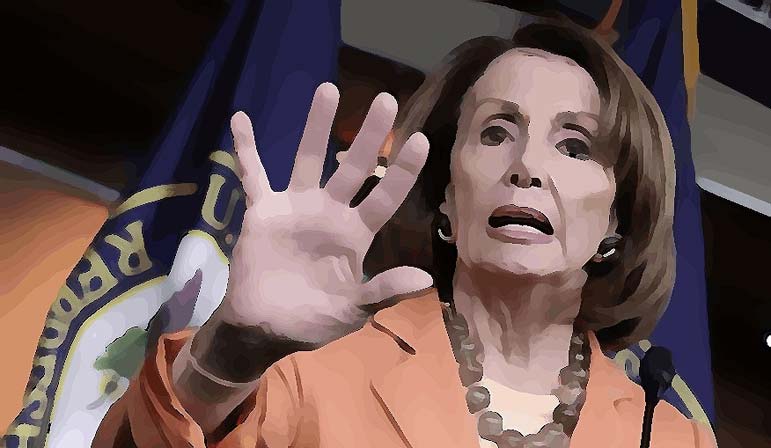
Progressive Democrats are eager to set the agenda in the new House majority, but they're about to face resistance from a large faction of moderates who want to tame the ambitions of the party's left flank.
How Speaker-in-waiting Nancy Pelosi manages the tension, which is already on display, will frame the 2020 Democratic presidential nomination race, as the House will serve as the party's main power center to advance its agenda and draw contrasts with President Donald Trump.
Messy battles between the party's factions risk undercutting Democrats hopes of rallying to defeat Trump in the next election, potentially costing them the chance to define the political debate and highlight favorable issues.
"Your swing votes on a lot of these issues are going to come from the middle," said New Jersey Democrat Josh Gottheimer, a co-chair of the Problem Solvers Caucus, a bipartisan group of centrists. "If you look at how we just captured the House it was through the middle, through seats like mine. And so the middle should have -- and will have -- a really influential voice in the legislation we pursue, and on how it's crafted and shaped."
Rep. Pramila Jayapal of Washington, who will co-chair the Congressional Progressive Caucus, sees it differently. "Progressive voters were key to our victory, and our majority. I don't think we can lose sight of that," she said in an interview, warning Democrats not to betray their promise to advance bold populist ideas and change the way Washington works.
The last time Democrats controlled the House, in 2009 and 2010, the balance of power rested with moderates who narrowed the scope of the Affordable Care Act; the left reluctantly accepted their demands to ensure passage of the law. Centrist Democrats also succeeded at establishing "pay-as-you-go" budget rules opposed by many progressives.
A decade later, history may be repeating itself, as Pelosi's quest to retake the speaker's gavel faces opposition from some right-leaning Democrats who refuse to support her and others who have agreed to back her after securing procedural changes that would empower moderates.
The Progressive Caucus intends to "flex our muscle" and push Pelosi to advance more liberal policies such as "Medicare-for-all," debt-free college education, bolstering collective bargaining rights for workers and restructuring the immigration system, Jayapal said. Next year won't be like 2009, she insisted.
"Progressives have the balance of power with us. Our voice will be at the table on leadership, which was not necessarily the case back then. But we also have the country with us," she said. "You will see us leveraging our power."
The Progressive Caucus expects to have 90 to 95 members as well as the energy of the party base, which Democratic leaders say will give the group a megaphone to extend their influence. Many of their ideas wouldn't pass the Republican-led Senate or be signed into law by Trump, but they want to convey their vision to voters ahead of the 2020 election.
Some of the young, newly elected Democrats with passionate bases of support, such as New York's Alexandria Ocasio-Cortez and Michigan's Rashida Tlaib, have already made a splash with their outspokenness and willingness to clash with party leaders and establishment figures.
House progressives intend to work with outside activist groups like MoveOn and Indivisible to pressure reticent Democrats to support those types of progressive ideas and to craft messages to sway public opinion. While they're still discussing how best to leverage their power, "we'll use every tool in the toolbox," Jayapal said, including attaching their priorities to must-pass spending bills to keep the government functioning.
"Sticking together as a voting bloc to help move a particular policy will be very important," Jayapal said. It's a tactic used successfully by the conservative House Freedom Caucus to move GOP bills to the right by refusing to provide votes until their demands were met. But it also at times resulted in stalemates that thwarted attempts at compromise.
That would set up a clash with centrists in the Blue Dog Coalition, the New Democrat Coalition and the Problem Solvers Caucus, the ranks of which will be expanded with the election of 25 Democrats in more conservative districts, like New York's Anthony Brindisi, Utah's Ben McAdams and Virginia's Abigail Spanberger.
Many opposed left-leaning proposals like Medicare-for-all during their campaigns, and are positioning themselves on the right by refusing to back Pelosi or by endorsing rules changes that give more power to moderates.
"I know there's going be some tension," said Gottheimer, who represents a relatively conservative area in New Jersey and is a member of all three groups. "You have to represent your district and vote your district. It's really important that we understand that we're from different places -- different districts."
Gottheimer declined to speculate on policies like Medicare for all or debt-free college, saying the party's focus should be on more modest proposals that can pass the Senate and be signed into law by Trump, such as an infrastructure bill, fixing problems in health-care markets, and resolving the status of young undocumented people.
He added that Democrats who "want to obstruct for the sake of it" or to "scream and yell" won't find allies in his group of centrists.
The Blue Dog Coalition added seven newly-elected Democrats, all from competitive districts currently held by Republicans, and expects to number at least 24 come January.
Rep. Stephanie Murphy of Florida, an incoming Blue Dog co-chair, said the group intends to focus on "bipartisan cooperation, fiscal responsibility, and national security."
Drawing an implicit contrast with liberals eyeing legislative proposals that lack Republican support, Murphy warned against "partisan stalemate that brings our country to a halt."
Democrats got their 40th House pickup last week after California's David Valadao conceded in a narrow defeat that stunned Republicans. It's the party's largest House gain since the Watergate era and secures a 235-seat majority. Apart from legislation, Democrats will also face internal tension between progressives who want to aggressively investigate the Trump administration and others who want to be cautious not to be perceived as overreaching.
"We have a 17-seat margin, so for some of the members who are afraid of their constituents, they don't necessarily have to vote with the rest of the caucus," Wisconsin Democrat Mark Pocan, the other co-chair of the Progressive Caucus, said. "But we should be able to move good ideas forward."
Pelosi, D-Calif., may be politically toxic in conservative parts of the country, but behind the scenes on Capitol Hill she's known by both allies and foes as a master tactician with a talent for cajoling members and wrangling votes.
Pelosi's deputy chief of staff, Drew Hammill, said Democrats will be united around their top priority of anti-corruption legislation that seeks to reduce the influence of money in politics, expand voting rights and require the president to disclose his tax returns, a swipe at Trump, who has refused to do so. Pelosi has previously talked about give-and-take in politics and said that every battle among factions of the party shouldn't be treated as if it's the last fight.
Sen. Chris Van Hollen, D-Md., a Pelosi ally who served in the House for 14 years, said she'll be able to handle the tension: "The secret to Nancy Pelosi's success has been her ability to bring together all parts of the caucus."
(COMMENT, BELOW)
Previously:
• 07/24/18 This House special election poses latest test of 'blue wave'
• 08/29/16 Hillary tries to separate Trump from Republicans, worrying some Dems
• 05/04/16 Ted Cruz's rise and fall is explained by a cruel paradox
• 04/27/16 Up next: Trump aims to prove critics wrong in foreign policy speech
• 02/24/16 Evidence of 'political revolution' in name only
• 01/19/16 Experts say Rubio's economic plan doesn't add up
• 01/06/16 What the 2016 presidential candidates must do to win
• 12/31/15 Six factors that could make a difference for Republicans in 2016
• 11/25/15 Bromance on the rocks: surging Cruz begins to poke Trump
• 09/23/15 Scott Walker's shocking exit: A tipping point in the Republican primary?
• 05/06/15 GOP-backed ObamaCare?


 Contact The Editor
Contact The Editor
 Articles By This Author
Articles By This Author